by Jasmin Ramsey
As I mentioned here, the debate over US military action to prevent an Iranian nuclear weapon was mostly on the back burner last year, but as Iran and six world powers known as the P5+1 head to Vienna to negotiate a comprehensive solution, it’s rearing its head again. That’s because we’re at an unprecedented, pivotal moment in this conflict’s history. If a final deal is reached, the prospect of an Iranian nuclear weapon will become highly unlikely; if no deal is reached, those chances increase along with the prospect of some kind of war.
“Diplomacy is so much cheaper than using the military instrument,” said ambassador Peter Galbraith, who has been heavily involved in peace negotiations for more than two decades, on a call today hosted by the Center for Arms Control and Non-Proliferation.
“But a more important point is that in all these things, you need to consider what your alternatives are, and frankly, there is no good alternative to a negotiated solution,” he added.
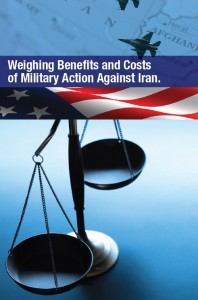 A US military campaign to prevent Iran from building nuclear weapons would likely be another expensive, resource-heavy, prolonged conflict in the Middle East. This has been the conclusion of reputable US military and intelligence experts, and no matter how much Israel beats its chest, it can’t effectively go at it alone. What’s more, striking Iran could actually compel it to rush for a bomb, which the leadership — after all these years — has not decided to do as of yet.
A US military campaign to prevent Iran from building nuclear weapons would likely be another expensive, resource-heavy, prolonged conflict in the Middle East. This has been the conclusion of reputable US military and intelligence experts, and no matter how much Israel beats its chest, it can’t effectively go at it alone. What’s more, striking Iran could actually compel it to rush for a bomb, which the leadership — after all these years — has not decided to do as of yet.
“What is keeping Iran from developing nuclear weapons is not a technological ability,” notes Galbraith, who served for 5 years as a senior advisor to the Senate Foreign Relations Committee on the Near East and South Asia. “It’s that it has made a political decision for the time being not to develop them.”
That political decision is being verified as we speak while the interim deal known as the “Joint Plan of Action” (JPA) reached in Geneva on Nov. 24 is being implemented.
“People who think this is a waste of time overlook fact that the interim agreement gives us a far better view of whats going on in Iran than without it,” said Lt. General Robert Gard (ret.), who saw combat in the Korean and Vietnam Wars during his 31-year military conflict, also on the call.
Under the JPA, Iran has halted and even rolled back parts of its program as well as opened itself up to inspections and verification visits by the International Atomic Energy Agency (IAEA) in addition to those already imposed on it by the Nuclear Non-Proliferation Treaty (NPT). Iran is even cooperating with the IAEA on the contentious issue of past possible military dimensions to its program.
Laicie Heeley, a policy expert at the Center who moderated the call said people shouldn’t expect a “perfect agreement” because as with all negotiations, “compromises will need to be made”. But the fact remains that if a mutually acceptable deal is reached, “we’re avoiding an Iranian nuclear weapon and another war in the Middle East.”
Who can argue against that?
Photo: The head of Iran’s Atomic Energy Organization, Ali Akbar Salehi, shakes hands with International Atomic Energy Agency chief Yukiya Amano, right, on Nov. 13, 2013 after signing an agreement in Tehran to allow inspectors broader access to Iranian nuclear sites.

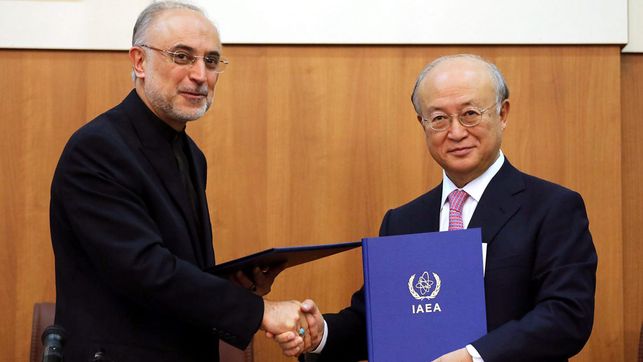
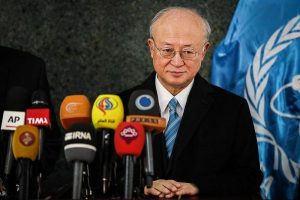

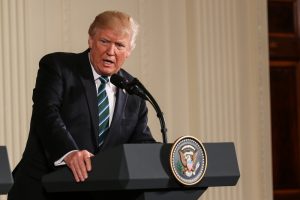
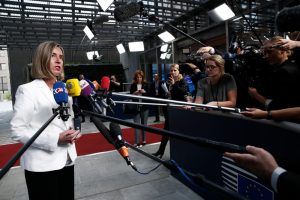
The world will soon find out if the hardliners in Iran have been right all along in maintaining that the real objective of Israel and her friends in Washington is not a non-nuclear Iran but a post-revolutionary Iran without its present theocratic regime. For over a century first the British and then the Americans have been trying to manipulate the internal affairs of Persia/Iran for their own benefit. In 1979 these efforts blew up in their faces and resulted in the present anti-western regime. If the United States refuses to bargain in good faith with Iran and elects to pursue the military option instead, President Obama will be making the biggest blunder in American foreign policy of the last generation and one that brings to mind the blank check that Kaiser Wilhelm wrote Austria-Hungary in 1914.
Yes, let us have an effective deal between P5+1 and Iran, in the interests of Iran and the region, and the world. Even if Aipac does not want one.
@Arizona – – Obama himself seems willing to see removal of sanctions, and a resultant stronger Iran. If a deal with P5+1 is made, and Iran adheres to it.
You may have a more then valid point there, A-B. It would fall into line, most everything about the “O” he’s responsible for, since he was elected P.O.T.U.S., that seems to be driven, not by him, but those who want him to fail, especially now that he’s in the final stretch of his run. They may pay him off with a “Grand Library”, but don’t they do that for the ex-president? That will pale to what he’ll be remembered for in the future, if the warmongers succeed in blowing up the present opportunity and military action replaces it.